Background: On Wednesday 19 September 2007 I addressed the dinner of the Council of Ambulance Authorities (CAA) conference in Townsville. Much of the content of the address still seems relevant ten years on.
I love a sunburnt country, A land of sweeping plains, Of ragged mountain ranges, Of droughts and flooding rains. I love her far horizons, I love her jewel-sea, Her beauty and her terror The wide brown land for me! (second stanza of My Country by Dorothea Mackellar (1885–1968)
It’s not even My Country so I have a nerve to stand here and talk about the importance of rural and remote Australia.
It is therefore particularly appropriate that I begin this address by acknowledging the owners of the country on which we stand.
After 60,000 years of the most ancient continuous civilisation in the world, white man arrived.
For him, the Australian outback was a new frontier.
The pattern of white settlement was determined by the distance a Cobb and Co coach could travel in daylight hours. Staging posts with pubs, stables and residences sprang up every 30 miles or so.
The historian Russell Ward believed that the notion of ‘mateship’ was born among country men and women struggling on this new frontier in the 1880s and 90s. Others have asserted that this new white Australian idealism was merely a projection onto the Bush of values admired by urban intellectuals.
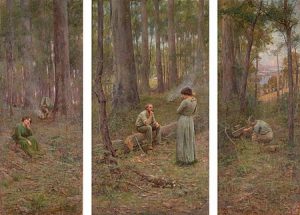
The Pioneer, Frederick McCubbin, 1904; in the National Gallery of Victoria
Whatever the truth about its provenance, the notion of mateship is still associated with the essence of being Australian. Young Australian mates, often with their horses, went off to Palestine and Gallipoli, casting Australian national independence in the furnace of overseas war.
And Australia’s sense of community – its pride in ‘the fair go’ – owes much to the real experience and the perceived value of the egalitarianism, the togetherness and the willingness to share risk that are the hallmarks of this mateship.
Rural and remote parts of the country were the setting for many of the experiences and narratives that set the pattern.
And those same rural and remote areas are now those in which the loss of ‘mateship’ is having its most devastating effects.
As a nation we appear to have lost the conviction that the best way forward is for everyone to look after everyone else. Australia has become more an economy, less a community. Its people are more and more driven by individual aspirations and greed. Some of these elements are in danger of corrupting our universal health system. There is a fear that Medicare will be a safety net for those who cannot afford to buy their own health services.
But back to the chronology of white rural Australia.
In our lifetime there has been a gradual withdrawal of governments from determining the pattern of settlement, and a gradual empowerment of the market.
In the early 1970s Australia had a burst of explicit regional development. Bathurst/Orange and Albury/Wodonga were designated as formal growth centres. There was decentralisation of government offices, some of which still survive today, with the New South Wales Department of Agriculture still headquartered in Orange.
But that miniature dash of government intervention was the exception to prove the rule. There has been sporadic but continuous support for agriculture and agriculturalists — but little or nothing for other aspects of rural and remote settlement.
The market rules – okay’.
For some time after the second war the Government maintained a strong interest in rural areas for political reasons. There was a fear of Communist takeover of Australia. Reds were under the bed. If we didn’t settle inland Australia, Indonesia would.
More recently the fate of regions has been determined by industry and the investment decisions of individuals in Japan, and now India and China. Our resource-rich regions are booming and making Australia an even more affluent nation. But it is impossible to find a house in Tom Price. Health services cannot be sustained in such places because of the difficulty of finding accommodation for health professionals.
80% of the Australian population lives within 30 miles of the sea. Real estate prices have been high and increasing in Sydney for 30 years. People half our age have become real estate millionaires. More recently, the same has happened in Brisbane and Perth.
A small number of regional centres have grown and have bled the surrounding smaller towns. Toowoomba is a town of 100,000 people. There are 57,000 in Wagga Wagga.
Large numbers of smaller towns have continued to shrink. Services have been lost. Pubs have closed – with the pokey licences, as we now understand it, sold to populous areas of the cities.
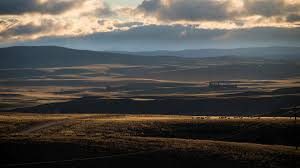
The Monaro
This is all part of the reality in Australia today: the rich are getting richer and the poor more numerous. The poor in Australia are not getting poorer in absolute terms but the number is increasing and the gap between them and the rich is increasing.
The rate of bulk billing in a country town may not matter to you and me. But for some people the presence or absence of a bulk billing doctor is a difference between the ability to see a doctor and not.
I fear a sunburnt country With governments laissez faire When the market shares the wealth around And citizens don’t care. Every man’s an island Compassion’s killed by greed When economy rules everywhere It's community we need.
The Productivity Commission has suggested a range of substantial changes to the health workforce[1]. Some of them have been the reality – on trial, as it were – in rural and remote areas for years.
In response to the Productivity Commission Report on Health Workforce, governments agreed (through the Council of Australian Governments):
- “to increase governments’ collaborative effort regarding retention of health staff;
- to endorse the National Health Workforce Strategic Framework with a biennial review and report to COAG on progress with implementation of the Framework;
- that all broad institutional Health Workforce Frameworks should make explicit provision to consider the particular workforce requirements of rural and remote areas, and the particular workforce requirements of groups with special needs including Indigenous Australians, people with mental illness, people with disabilities and those requiring aged care; and
- that Senior Officials will undertake further work in relation to the remaining key recommendations of the Productivity Commission and report to COAG in mid-2006 on further action that governments could take in regard to health workforce, having consulted with key stakeholders.”
Only one of these has become a COAG project: the potential national accreditation of health professionals. It is touch and go as to whether changes on this front will be able to be signed off before the election is called.[2]
What has all this to do with rural and remote areas?
The current system is not working. There will never be enough doctors, nurses or allied health professionals, given the exponential increase in demand for their services and the volume and location of international supply. If we think things are difficult now, it is going to get much much worse.
Whereas three years ago 170,000 new workers entered Australia’s workforce in a year, in the whole of the decade 2020 to 2030 it will be 125,000. That represents a change from 170,000 new entrants a year into Australia’s workforce, down to 12,500 a year beginning in 2020.
We therefore must do two things. We must suppress the demand for the services of health professionals. And we must change the way in which supply is provided. For example we must reduce the demand for doctoring and increase the supply of doctoring- type services.
This is what the Productivity Commission and others mean by health workforce redesign. Opponents of such redesign tend to be marshalled by the professional colleges, not just medical colleges but also by others. Nursing organisations do not support greater use of or a broader scope of practice for care assistants. Physiotherapists do not support physiotherapy assistants. Doctors’ organisations do not support physicians’ assistants. And so it goes
The work being done in the paramedic and ambulance officer sector to broaden scope of practice is critical. You can lead the way in workforce redesign and prove that it does work, is popular with patients, and does not threaten other professions.
And rural and remote areas can lead the way in this.
For too long, the politics and policies of rural Australia have been dominated by agriculture. One of the results is that the word ‘rural’ is still co-opted by agriculturalists and their supporters. The political parties speak of rural policy when they mean agricultural policy. The Rural Industries Research and Development Corporation works with the smaller agricultural industries. The Rural Adjustment Scheme deals with support for farmers.
The National Rural Health Alliance has emerged as the most inclusive and comprehensive voice for the non-agricultural aspects of rural affairs in Australia.
The NRHA can speak up for the interests of rural people who are not farmers. It can represent the interests of the significant minority who do not have good access to telecommunications.
And it is an important time for making such representation. A range of key policy issues are going to change the way we do business and experience lifestyles in the next few years.
There is a continued search for new energy sources that will reduce reliance on carbon fuels. Industries based on renewable energies will by definition be predominantly in rural and remote areas. The new sources of energy will be the sun, the sea, biomass, hydrogen, the wind – all of which are found in abundance in rural areas and all of which can be processed or captured more easily in rural areas than in the cities.

There will be major shifts in relative prices, so that energy technologies which are currently not economic or sustainable will become so. This will be much to the benefit of country areas.
However there are some ongoing resource issues that will bear down differentially on rural industries and communities. Australia has a national water crisis. Desalination plants may be located in the cities but the most important water storages and catchment areas will be in country areas. The impact of salinity and reduced water flows is felt in rural areas. In country areas whole towns can be without water supplies. The impact on crops and incomes is easy to understand.
There needs to be an ongoing debate about access to and use of information technology. The communication challenges of very remote areas can be overcome to some extent by high technology, such as satellites. The people who are missing out tend to be those who are not isolated enough to have public support for the establishment of satellite connections, but who do not have access to copper wire. The termination of the CDMA system is concerning some people because the new-generation of telecommunications does not work in some more rural areas.
The results of debate about nuclear fuel will also have a significant impact on rural areas. Uranium is found in rural areas and the debates about the storage of waste will always be focused on non-metropolitan areas.
Loss of species is predominantly a rural issue. National parks. Coalmining. Climate change will result in more adverse events, with the geographical scope of natural disasters increasing with rurality.
We need government leadership on these issues: leadership that is not afraid to use ‘the big levers’ – the tax system, regional development policy, public-private partnerships, transport, education, housing, infrastructure – as well as health services.
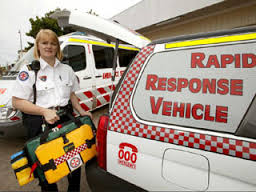
It’s going to be a good time for paramedics and ambulance officers, and your organisations, to lead on workforce redesign, to show what can be achieved despite the tyrannies of distance and markets.
I seek a sunburnt country Where all can have a share When each of us will cross the street To someone needing care. Life chance and opportunity For each and every Man And if governments are bold enough ‘Tis certain that we can. As publicans and posties We seek your strong support To reach our side and intervene When in extremis caught. Our farmers and our schoolies Their gratitude won’t hide If you can bring your broadened skills Full swiftly to our side.
[1] www.pc.gov.au/inquiries/completed/health-workforce The research report was released on 19 January 2006.
[2] Prime Minister Howard called the Election on 14 October 2007 and the Federal election for the 42nd Parliament of Australia was held on Saturday 24 November 2007.

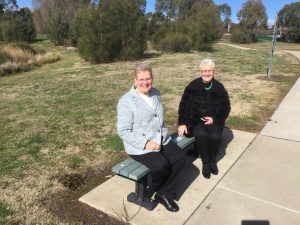
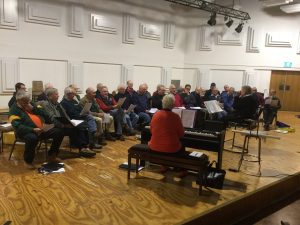 She's danced on the ivories since she was eight
She can finger just all of the keys
And though you don't know it, she played cello too -
- Just a keyboard between both her knees.
She came to Australia forty-six years ago
For a while she needed to roam;
In Sydney, Port Stephens and then Central West
With Lesley she made a warm home.
She served in her towns for political reps
In the community and in the pews
Les always behind her to get them the papers
- In those days there wasn't 'Fake News'.
Her church and her music are precious to Bev
And in Orange from nineteen-eight-nine
The Rowland Gregory Orpheus Singers
Took much of their after-work time.
She's danced on the ivories since she was eight
She can finger just all of the keys
And though you don't know it, she played cello too -
- Just a keyboard between both her knees.
She came to Australia forty-six years ago
For a while she needed to roam;
In Sydney, Port Stephens and then Central West
With Lesley she made a warm home.
She served in her towns for political reps
In the community and in the pews
Les always behind her to get them the papers
- In those days there wasn't 'Fake News'.
Her church and her music are precious to Bev
And in Orange from nineteen-eight-nine
The Rowland Gregory Orpheus Singers
Took much of their after-work time.
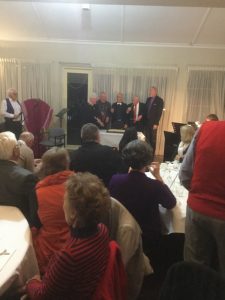 Bev was accompanist, Les in the choir,
Together a close double act.
Her favourite key was always G Flat
For in that mode it's mostly All Blacks.
Apart from her partner there's one other man
For whom Bev has always been true
In tune with each other, from bar to bar,
And Leon, you know that it's you.
Alpha met Bev at the Sydney Town Hall
- The memory both of them chat-on
The men tried to speed up But Bev remained geed-up
She said "It's like cricket: When you're at the wicket
Keep your eyes on your leader She'll declare when she needs-ta;
In the meantime please all watch her baton."
Alpha and Bev became very firm friends
Similar women with similar ends -
Though Sasha and Toby, you all will agree
Were closer companions than Alpha could be!
Alpha has written in elegant prose
Of the Beverley Glover that each of us knows.
She has energy, patience, she's keen to do more
In musical matters she knows the full score.
Her large congregation of this is apprised:
On Sundays she'll keep her church well organ-ised.
Her laugh is infectious, she's full of kind tricks
And only in silence when watching Netflix.
Bev was accompanist, Les in the choir,
Together a close double act.
Her favourite key was always G Flat
For in that mode it's mostly All Blacks.
Apart from her partner there's one other man
For whom Bev has always been true
In tune with each other, from bar to bar,
And Leon, you know that it's you.
Alpha met Bev at the Sydney Town Hall
- The memory both of them chat-on
The men tried to speed up But Bev remained geed-up
She said "It's like cricket: When you're at the wicket
Keep your eyes on your leader She'll declare when she needs-ta;
In the meantime please all watch her baton."
Alpha and Bev became very firm friends
Similar women with similar ends -
Though Sasha and Toby, you all will agree
Were closer companions than Alpha could be!
Alpha has written in elegant prose
Of the Beverley Glover that each of us knows.
She has energy, patience, she's keen to do more
In musical matters she knows the full score.
Her large congregation of this is apprised:
On Sundays she'll keep her church well organ-ised.
Her laugh is infectious, she's full of kind tricks
And only in silence when watching Netflix.
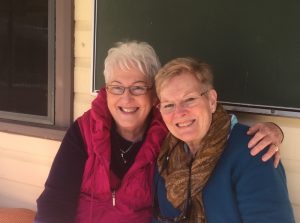 We will share her on Facebook, we will see her on Skype,
And her legacy's plain, she is one of a type.
Let us pick up her mantle, let us go where she's led
Our thanks not piano but forte instead!
For Bev's contributions will always inspire
After thirty-odd years with the Male Voice Choir.
12 May 2017
We will share her on Facebook, we will see her on Skype,
And her legacy's plain, she is one of a type.
Let us pick up her mantle, let us go where she's led
Our thanks not piano but forte instead!
For Bev's contributions will always inspire
After thirty-odd years with the Male Voice Choir.
12 May 2017